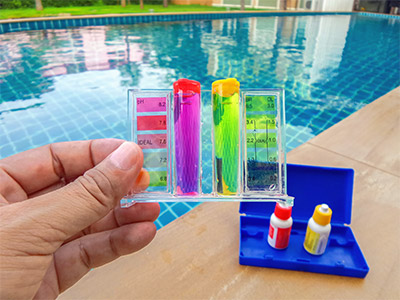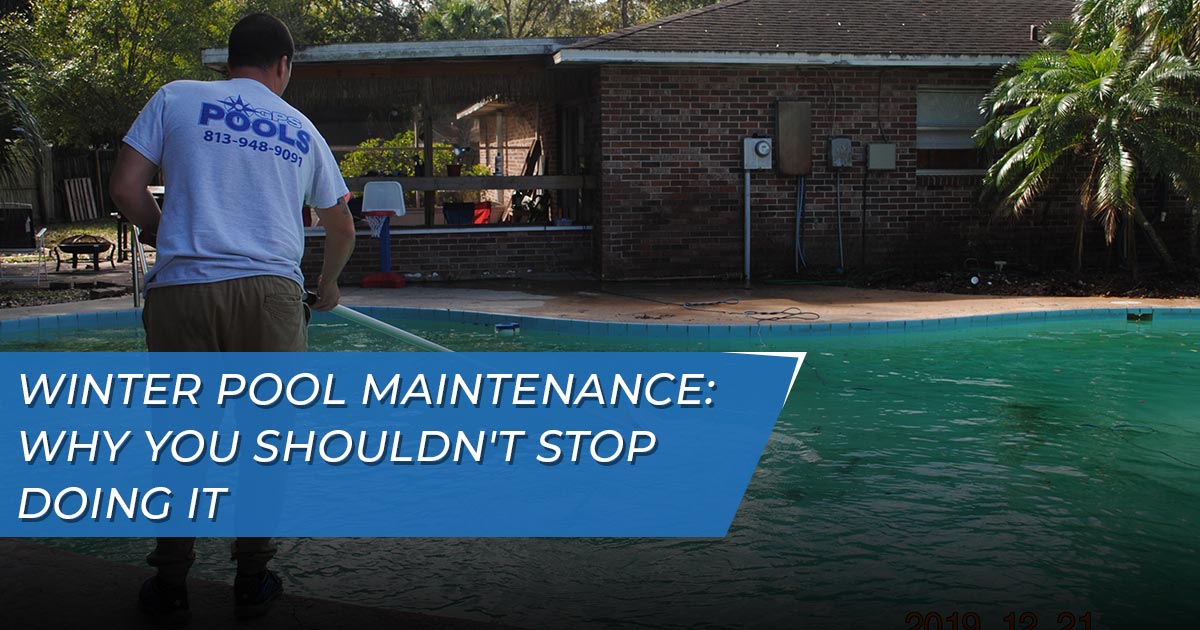Winter Pool Maintenance: Why You Shouldn’t Stop Doing It
When it comes to pool maintenance in winter, persistence is key. Even though the water is colder, and we aren’t swimming as much the pool still needs to maintain a good chemical balance.
Even though you’ll likely use your pool less in the winter, you’ll be more likely to encounter chemical imbalances. Time and time again, homeowners closing their pool off over the holidays can’t protect their pools from their own cleaning materials.
Improper Winter Pool Maintenance and Chemical Imbalances
Often, pool maintenance takes place in small steps–steps that incrementally handle material cleanup and chemical care alike. When you’re not running your pump regularly, however, your pool’s chemicals won’t be distributed evenly. Even though keeping the chemicals in might seem like a cleanliness benefit–the opposite, more often than not, tends to be the case.
Your pool’s pump thrives on consistency, and irregular operation can cause more wear-and-tear than normal–to your entire pool, that is. A running pump boosts the lifespan of your pool–as well as the lifespan of your pump, itself. Even if your pool is loaded with cleansing chemicals, stagnant waters can erode it over time.
Issues caused by Chemical Imbalances
 This erosion can happen quickly–even within the span of a couple months. From a mechanical perspective, a running pool pump means a running motor–and a running motor means heat generation. This heat evaporates harmful moisture both on and around the pump. If it isn’t evaporated, bacteria has a chance to thrive–even if the air around the pump is exposed to chilly winter air.
This erosion can happen quickly–even within the span of a couple months. From a mechanical perspective, a running pool pump means a running motor–and a running motor means heat generation. This heat evaporates harmful moisture both on and around the pump. If it isn’t evaporated, bacteria has a chance to thrive–even if the air around the pump is exposed to chilly winter air.
Where chemicals themselves are considered, waters not stirred by pool upkeep and a running motor can be damaging–even more so than bacteria growth, moisture and mildew. Your pool’s waters might look clear–but residual chemicals lingering in the water may be causing subtle, but very real, damage. This damage isn’t readily noticed, either, as it doesn’t create the unsightly waters associated with an unclean pool. Nonetheless, it impacts your pool on many levels.
Mechanical Damage
Much like humidity and bacteria growth, stagnant waters holding unstirred chemicals can do some damage on your pool pump. Concentrated chemicals may linger around your pump–especially if it’s used infrequently. Over time, these chemicals can wear away at your pump’s exterior–and even its motor.
To avoid this mechanical damage, try to run your pump for four to six hours per day as part of your winter pool maintenance. AIf you haven’t serviced your pump for some time, you can still make the best of the situation. We recommend draining your pump, filter and pool heater of water–as this can clear out concentrated chemicals. Then, fill them back up to freshen them up.
Filter Damage
Speaking of filters, you should keep a close eye on yours. Filters are far more susceptible to chemical damage than tough pump internals are, and they’ll wear down at a faster rate, too. Unfortunately, a lot of homeowners simply check their filters for backed up materials which have gathered over time.
Once you’ve removed any leaves, sticks and other material from your filter–double-check your filter for signs of wear-and-tear. It’s also a good idea to do some extra winter pool cleaning before you turn your pump back on, if you haven’t yet. Your pool pump can suck in gallons of water, and chlorine-concentrated water can pack a single, corrosive punch capable of eating away at your filter rapidly.
Pool Wall Damage
Even though your pool’s walls are designed to resist heavy use, they can’t handle acidic waters very well. Concentrated chemicals can cause etching on surface materials.Vinyl surfaces are particularly prone to chemical damage. If they’re exposed to acidic waters for an extended period of time, they can become brittle–cracking and tearing.
A high chemical concentration might cause the most direct damage to your pool’s walls, but there are other factors to consider, too.
pH Imbalance Damage
Winter pool maintenance prioritizing chemical care maintains a healthy water pH value. Even if its waters are saturated with stagnant chlorine, they aren’t benefiting from working chlorine. Over time, your pool water might have a low pH value which makes the pool more acidic—which, in turn, will break down the walls faster. This causes a lot of damage in a couple of months.
Low-pH water also wears away at your pump’s motor, erodes o-rings, wears down seals and causes filter issues. It can even be harmful, if the imbalance is severe–causing skin and eye irritation once your pool is open for use again.
Related: How to Maintain a Swimming Pool: Getting the Chemistry Right
Other Factors to Consider for Winter Pool Maintenance
Winter pool maintenance is certainly important for avoiding costly pool repairs, but it’s also vital to your pool’s appearance. Chlorine, even if it isn’t concentrated, is strong: It can sanitize thousands of gallons of water in little time. Even a well-maintained pool needs some degree of surveillance, as chlorine cleaning, alone, can become a big problem for plastic, rubber and even metal.
Stained Surfaces
At the very least, a high chlorine concentration can cause visible staining to your pool’s interior surfaces. While many look for algae stains, too few examine their pool for bleached pool walls stripped of structural integrity. Chlorine damage can be unsightly, even if it isn’t excessive. Over time, however, unsightly surfaces can wear out completely–becoming warped and cracked.
Scale Deposits
Scale deposits form around a pool’s waterline. They’re caused by pH imbalances and calcium imbalances alike. As these deposits form, calcium is pulled from the pool’s shell–damaging the surface in the process.
If scaling issues persist, a pool’s shell can crack due to lacking calcium. Much like chlorine stains, scale deposit damage create visible eyesores–especially when a pool has a darker finish. Even worse: Cracked walls low in calcium crack easily, and cracked pool walls are expensive to repair.
A Little Winter Pool Cleaning Goes a Long Way
Even if you’re not using your pool much during autumn and winter, make sure you maintain regular cleaning and check-ups.
Sure, pool maintenance in winter can be a discouraging process when a pool, itself, isn’t being used. But even a biweekly cleaning can keep a pool’s waters balanced, sightly and clean. Not only will your pool look great when spring rolls around–but it’ll be much easier to care for, too.
When the air gets cool, keep an eye on your pool. At the end of the day, the process pays off.

